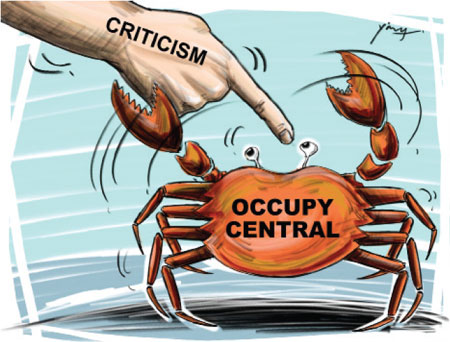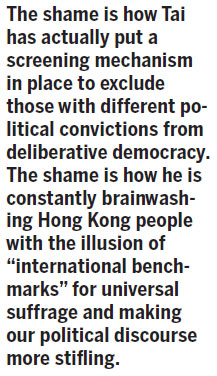Tai's undemocratic screening
Updated: 2013-04-06 07:51
By Chan Wai-keung(HK Edition)
|
|||||||


The distinguished Harvard academic Niall Ferguson recently published The Great Degeneration, eloquently arguing that representative government, the rule of law and civil society, the three essential pillars of Western societies, have degenerated. Western democracies have broken the contract between the generations by allowing the current generation of voters to live at the expense of those too young to vote, or as yet unborn. The Western rule of law has woefully metamorphosed into the autocratic rule of lawyers. Worse still, Western civil society has become uncivil society. In contrast to Francis Fukuyama's unfashionable notions of "the end of history" and "the ultimate triumph of liberal democracies", Ferguson has concluded that to arrest the degeneration of the West will take heroic leadership and radical reform of political systems. Echoing Ferguson's notions, some Western scholars and intellectuals like Joshua Cooper Ramo have proposed an alternative to the concept of John Williamson's prescriptive Washington Consensus as well as Anglo-American notions of democracy.
It is deplorable that some self-proclaimed democrats, especially certain academics, in Hong Kong are still stubbornly clinging to Anglo-American style democracy, losing sight of Western degeneration in our time. More lamentable is the hypocrisy and self-contradiction in their campaign for "democracy". A telling example is the planned "Occupy Central" campaign propagated by Benny Tai Yiu-ting and Chan Kin-man, the well-known anti-Beijing scholars. In recent weeks, these architects of the campaign have vehemently denounced the "screening mechanism" in the 2017 Chief Executive (CE) Election floated by some pro-Beijing politicians as "undemocratic". Ironically, at the same time, in launching their "democratic campaign", they could not have brazenly devised a more undemocratic mechanism to screen out campaign participants who disapprove of their political ideas.
Last Wednesday, in conjunction with Reverend Chu Yiu-ming, both Tai and Chan held a press conference in a bid to officially release their formal campaign manifesto with three important points.
According to the second point of their manifesto, only through democratic process including deliberative interaction and delegation of power by the people can Hong Kong come up with a proposal for the 2017 CE electoral system. But, as I wrote in my commentary in this newspaper on March 14, the process to complete the four-step plan proposed by Tai is undemocratic and exclusive.
It is even not too far-fetched to suggest that the spirit of the entire campaign of "Occupy Central" is actually antithetical to the second point of their manifesto. As Tai said, all the participants in the unlawful campaigns would be requested to participate in "Deliberation Day". Drawing on the concept of "Deliberation Day" coined by Yale scholars J. Fishkin and B. Ackerman, Tai suggested that 10,000 citizens would be amassed in small groups to discuss different proposals to achieve universal suffrage. It is more noteworthy that before participating in "Deliberation Day" and the "Occupy Central" campaign, all participants must show conviction by agreeing to all the points of the manifesto.
Yet, in my view, the first and third points of the manifesto are problematic, contentious and unclear. The first point states that Hong Kong's electoral system must be compatible with the international benchmarks for universal and equal suffrage. Some questions about the meaning of this point will arise. What do Tai and Chan mean by international benchmarks for universal suffrage? Are there any international benchmarks for democracy in the world? Some opposition lawmakers, such as Cyd Ho Sau-lan, say that international benchmarks are enshrined in the International Covenant of Civil and Political Rights (ICCPR) adopted by the United Nations. But, the ICCPR did not specify the mode of universal suffrage. Worse still, the influential works of scholars like Ferguson and Ramo have called into question some Western political ideas on which the content of ICCPR is based. In the midst of Western degeneration, world-renowned intellectuals such as Eric X. Li and Zhang Weiwei have forcefully advocated cultural relativism, arguing that international benchmarks for democracy are illusory and it is imperative for non-Western countries to come up with an alternative to Anglo-American democracy.
Unfortunately, according to the requirement set by Tai and Chan, if you, being a cultural relativist, are skeptical about the Western style of representative government and democracy, question the existence of international benchmarks or universal values, and refuse to agree to the first point of the manifesto, you will be screened out and excluded from deliberation day. You will be deprived the right to discuss with other participants any alternatives to Western democracy such as Ramo's notion of "Beijing Consensus", Li's political model or Zhang's conception of "civilization state".
Likewise, if you are a law-abiding citizen, have a distaste for civil disobedience and refuse to agree to the third point of the manifesto about the way - the act of civil disobedience - to fight for democracy, you will be screened out and excluded from "Deliberation Day". You are deprived of the right to participate in "deliberative democracy".
And, if you forget to make a declaration of conviction by agreeing to the manifesto, or forget to participate in "Deliberation Day", you will probably be screened out and excluded from the final "Occupy Central" campaign.
In fact, Tai has grossly distorted the concept of "Deliberation Day" put forth by Fishkin and Ackerman. The Yale scholars proposed taking a representative random sample of people for the deliberation through invitational mails. By contrast, Tai has devised a bizarre screening mechanism in the name of "deliberative democracy" to exclude others whose political convictions are incompatible with his.
The shame is not that some pro-Beijing politicians have proposed a screening mechanism in the CE election to exclude some anti-Beijing candidates. The shame is how Tai has actually put a screening mechanism in place to exclude those with different political convictions from deliberative democracy. The shame is how he is constantly brainwashing Hong Kong people with the illusion of "international benchmarks" for universal suffrage and making our political discourse more stifling.
The author is a lecturer at the College of Professional and Continuing Education at Hong Kong Polytechnic University.
(HK Edition 04/06/2013 page1)